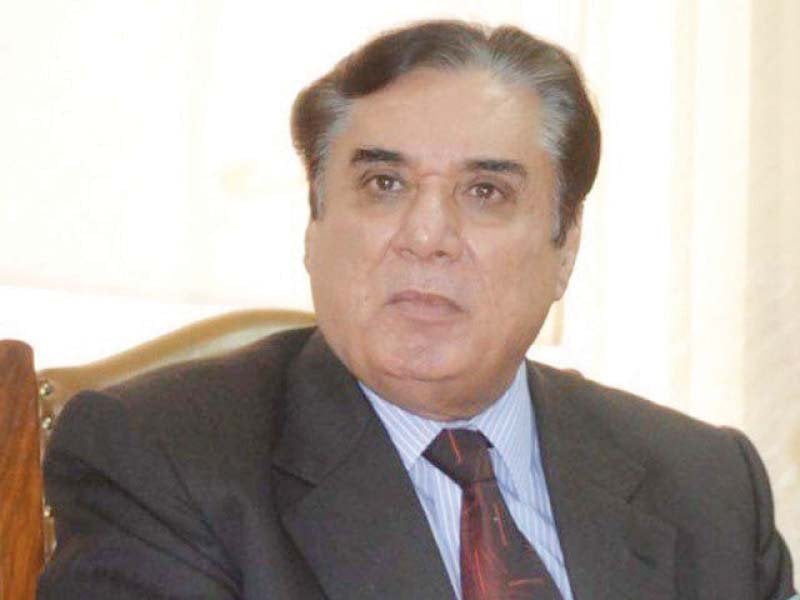
According to sources, the government mulls over amending the law to limit NAB to probing the corruption matters related to public office holders only and the phrase ‘any person’ will be deleted from the relevant law. Currently, NAB can proceed against any person who lives beyond his means.
A proposal is also under consideration regarding restricting NAB from interfering in matters which are under the jurisdiction of anti-corruption departments and the Federal Investigation Agency (FIA) etc. The government, according to sources, also wants to define phrase 'mega corruption’ in the accountability laws.
PM seeks law minister’s input on appointment of NAB PG
The sources said that it was for sharing the proposed amendments with NAB Chairman Justice (retd) Javed Iqbal that Attorney General for Pakistan (AGP) Ashtar Ausaf Ali met him at his office on Wednesday. The law secretary and the NAB prosecutor general were also present during the meeting which lasted for two hours.
Later, the NAB chairman and the prosecutor general also held a meeting for half an hour.
The NAB chairman told the media after the meeting that it was just a courtesy call and there was no agenda of the meeting.
The sources, however, told The Express Tribune that the agenda of the meeting was to discuss proposed amendments to NAB laws. They said matters related to international arbitration were also discussed in the meeting.
Political analysts are giving much importance to this meeting of the top legal minds of the government with the NAB chairman, who is giving a tough time to ruling party members in high profile cases, especially related to the Punjab government.
Legal experts are already debating whether there is need to bring in a new legislation to improve the conviction rate in white-collar crimes in the country. They are examining whether the standard of proof for corruption and corrupt practices should be ‘balance of probabilities’, which allows inference from circumstantial evidence, or ‘beyond reasonable doubt’.
The debate is being held in view of the claims made by major political parties that white-collar crime is the biggest hurdle in the development of the country.
A former NAB official, who recently left a senior position at the bureau, said: “It is so difficult to convict anyone in a white-collar crime case that there is a need to bring in new legislation for this purpose.”
The lawyers are divided whether the ‘balance of probabilities’ should be used by accountability courts in corruption cases. A lawyer, who deals with white-collar crimes, believes that ‘balance of probabilities’ is relevant in civil cases but in criminal matters, all possibilities are to be excluded that the accused is innocent before he is convicted.
“This jurisprudence system has been in place for several centuries, which is being applied to white-collar crimes,” he says.
A section of lawyers thinks the country can only become corruption-free when the same approach is adopted in all white-collar crimes cases.
A lawyer says, “If the courts use ‘balance of probabilities’ then it should not use it selectively as the same method should be adopted against all, including civil servants, judges and generals.”
IHC rules NAB can investigate Musharraf
However, former additional prosecutor general Ali Imran Jafferi sees no need to amend the accountability law, and says investigation and prosecution should be improved instead.
“Under the NAB law, the prosecution should have been given a source of income and it is the duty of the accused to explain that his income is not beyond his means,” he opines.
Interestingly, Justice Asif Saeed Khosa of the Supreme Court also gave his view in dealing with matters related to corruption. However, senior lawyers want to debate his approach to deal with cases of white-collar crime.
In his 192-page judgment in the Panama Papers case, Justice Khosa said: “Corruption in high places is not a new phenomenon but the methods of corruption and concealing the proceeds of corruption have seen a dramatic change in recent times.”




1736599343-0/fizza-(8)1736599343-0-165x106.webp)






1736508423-0/Express-Tribune---News-Desk-(9)1736508423-0-270x192.webp)

1736495887-0/sidra--(63)1736495887-0-270x192.webp)









COMMENTS
Comments are moderated and generally will be posted if they are on-topic and not abusive.
For more information, please see our Comments FAQ